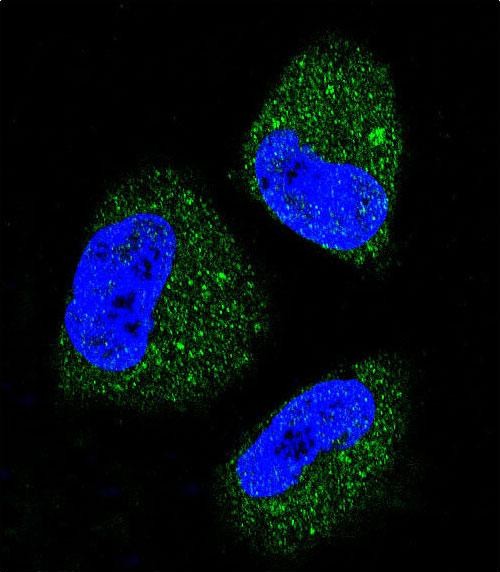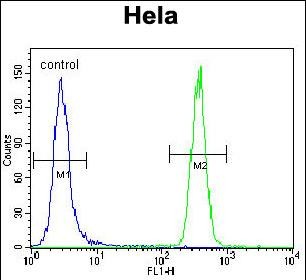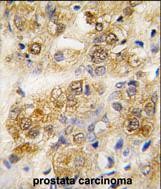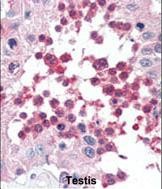





| WB | 咨询技术 | Human,Mouse,Rat |
| IF | 咨询技术 | Human,Mouse,Rat |
| IHC | 1/100-1/500 | Human,Mouse,Rat |
| ICC | 1/10-1/50 | Human,Mouse,Rat |
| FCM | 1/10-1/50 | Human,Mouse,Rat |
| Elisa | 咨询技术 | Human,Mouse,Rat |
| Aliases | 78 kDa glucose-regulated protein, GRP-78, Endoplasmic reticulum lumenal Ca(2+)-binding protein grp78, Heat shock 70 kDa protein 5, Immunoglobulin heavy chain-binding protein, BiP, HSPA5, GRP78 |
| Entrez GeneID | 3309 |
| WB Predicted band size | 72.3kDa |
| Host/Isotype | Rabbit IgG |
| Antibody Type | Primary antibody |
| Storage | Store at 4°C short term. Aliquot and store at -20°C long term. Avoid freeze/thaw cycles. |
| Species Reactivity | Human, Mouse |
| Immunogen | This HSPA5 antibody is generated from rabbits immunized with a recombinant protein encoding full length human HSPA5. |
| Formulation | Purified antibody in PBS with 0.05% sodium azide,1%BSA and 50% glycerol.prepared by Saturated Ammonium Sulfate (SAS) . |
+ +
以下是关于HSPA5(GRP78)抗体的3篇参考文献示例,供参考:
---
1. **文献名称**:*Targeting GRP78 in cancer: A novel therapeutic approach*
**作者**:Lee AS, et al.
**摘要**:研究探讨了HSPA5/GRP78在肿瘤细胞中的过表达及其作为治疗靶点的潜力。通过特异性抗体阻断GRP78功能,可抑制肿瘤生长并增强化疗敏感性,尤其在乳腺癌和前列腺癌模型中效果显著。
2. **文献名称**:*GRP78 antibody reveals its role in neuronal ER stress and Alzheimer’s disease pathogenesis*
**作者**:Zhang X, et al.
**摘要**:利用HSPA5抗体检测发现,阿尔茨海默病患者脑组织中GRP78表达异常升高,提示其在内质网应激介导的神经元凋亡中起关键作用,为神经退行性疾病的机制研究提供依据。
3. **文献名称**:*GRP78-specific monoclonal antibody suppresses viral replication by targeting host stress pathways*
**作者**:Wang J, et al.
**摘要**:研究表明,针对GRP78的单克隆抗体可通过干扰病毒与宿主细胞的相互作用,抑制登革热和新冠病毒的复制,揭示了HSPA5抗体在抗病毒治疗中的潜在应用。
---
**备注**:以上文献为示例性质,实际引用时建议通过PubMed或Google Scholar检索最新研究,使用关键词“HSPA5 antibody”“GRP78 therapeutic”等获取具体文献信息。
HSPA5. also known as glucose-regulated protein 78 (GRP78) or binding immunoglobulin protein (BiP), is a member of the heat shock protein 70 (HSP70) family. Primarily localized in the endoplasmic reticulum (ER), it functions as a crucial molecular chaperone involved in protein folding, assembly, and quality control. HSPA5 binds to nascent polypeptides via its substrate-binding domain and facilitates proper folding through ATP-dependent cycles. During ER stress, its expression is upregulated to mitigate unfolded protein accumulation, activating the unfolded protein response (UPR) to restore cellular homeostasis.
HSPA5 antibodies are essential tools for detecting and quantifying this protein in research. They are widely used in techniques like Western blotting, immunofluorescence, and immunohistochemistry to study HSPA5's role in diseases linked to ER stress, including cancer, neurodegenerative disorders (e.g., Alzheimer’s), diabetes, and viral infections. In cancer, HSPA5 is often overexpressed in tumors, promoting cell survival and drug resistance, making it a potential therapeutic target. Antibodies against HSPA5 also aid in investigating its interaction with viral proteins (e.g., SARS-CoV-2) or its involvement in autoimmune responses. Additionally, they support drug development efforts targeting HSPA5 to sensitize cancer cells to chemotherapy. These antibodies typically recognize specific epitopes, such as the ATPase domain or C-terminal region, ensuring specificity in diverse experimental models.
×